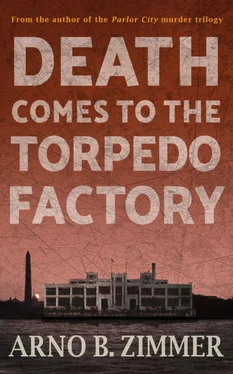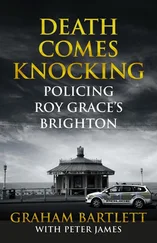When Helga finished, Augustus asked to see the two notes and the photographs. She had told him everything except for the meeting in New York City with Siegfried. When he saw the photograph of Helga with the German soldier, all his painful memories from that year in Berlin came flooding back. He was unable to deny the shame that he had brought upon the Dumont name over 30 years ago.
“If money will silence these people, it must be paid,” he finally said. “I do not want to know any more details other than those that are essential. Now, you will please leave me.” Augustus refused to look at his wife. Even she was constrained from saying another word and quietly left the library.
NELLIE BIRDSONG WAS back from her grandmother’s funeral and Woody was meeting her for dinner. It was a pleasant spring evening, ideal for a bike ride, but Woody would not have his evening circumscribed by the need to pedal home before dark.
His bright yellow VW bug was parked in the alley behind his apartment and sounded cranky when he started it. As he pulled onto North St. Asaph Street to make his way over to the George Washington Parkway, he did not notice the black sedan idling near the corner. Two men in dark suits were waiting patiently and followed Woody as he drove into DC.
CHAPTER SIXTEEN:
A Fateful Day?

RE-LIVING HIS EVENING with Nellie Birdsong, Woody was in heaven as he walked to Pudge McFadden’s the next morning. The incipient lovebirds sat on the veranda of a small café on Wisconsin Avenue not far from her apartment until they finally took the hint as two waiters scurried about and noisily stacked chairs on the empty tables around them.
After graduating from college, Nellie had stayed in DC and found a job with one of the trade associations that populated the downtown office buildings which disgorged their legions of lobbyists with easy access to cajole, induce, badger, bribe and otherwise convince government officials and congressmen to do their bidding.
Woody told her in very general terms about his duties as an Army MP but avoided any revelations – and she did not press him – regarding his experiences in Vietnam. He did not feel nearly as certain as he did back at Thorndyke College when he wrote an article for the school newspaper supporting Pres. Johnson and extolling U.S. intervention in Southeast Asia as, unquestionably, a just and noble cause. At the same time, he was dismayed by what he considered the efforts of many in Congress to continually hamstring and thwart the military’s ability to win the war which they had at least tacitly sanctioned. As a result, he reluctantly concluded that the U.S. should probably have learned from the failures of France and stayed out of Vietnam altogether. He shared these views with Nellie but she did not respond and he didn’t press her. As if by tacit agreement, they avoided the painful subject of Ralph Birdsong’s murder four summers ago in Parlor Harbor.
The two men who had tailed Woody to Nellie’s apartment followed them to the café. After watching them smile and laugh for about an hour, they concluded that nothing sinister was happening and drove off.
IT WAS EARLY afternoon and most of the lunch crowd at Pudge McFadden’s was dispersing. Pudge’s clientele, for the most part, did not have expense accounts and, as a consequence, could not linger at the bar on the pretext that they were finalizing a “business deal”.
Woody finally noticed that Nigel Longstaffe had not shown up and he mentioned it to Pudge. “He’s not doing well, kid. I looked at him yesterday and said to myself, ‘his days are numbered now.’ If he doesn’t come in tomorrow, I’ll go by and check on him.”
Longstaffe was a fixture on the seat in the corner of the bar and even though they rarely spoke, Woody had grown accustomed to and even sympathetic toward the forlorn Englishman who deserved better in life, had even earned it, but now wallowed in undeserved bitterness. Woody would make a point to say a few soothing words to this lost soul the next day even if he was treated roughly in return.
IT WAS JUST after lunch and the telephone rang at Scatcherd’s desk. He listened with a scowl on his face and then hung up without saying a word.
Ten minutes later, he looked up at the clock and limped out of the clerical area followed by several sets of eyes. He entered the stairwell at the far end of the hallway and looked down toward the first floor but did not see anyone. He had walked down a few steps when he heard his name whispered from the recess of the stairwell. It was soft, almost ghost-like, and it startled him. He turned around and snarled before unleashing a torrent of invective that was garbled and mostly unintelligible. When he stopped, he felt a sharp poke in his chest which caused a piercing pain. As he involuntarily stepped back, he leaned heavily on his bad ankle, lost his balance and reached for the guardrail. His hand skimmed the shiny, metal surface but he never got a grip.
The last thing Leonard Scatcherd remembered before he lost consciousness was the painful, repetitive thumping of the back of his head against the metal stairs.
IT WAS 30 minutes before a security guard on regular patrol came upon Leonard Scatcherd, but it would have made no difference if he had discovered him immediately after the fall. He was found on his back, staring up the stairwell, almost as if he was looking at someone standing at the top. The only evidence of serious injury was the pool of blood which encapsulated his head like a hideous dark red moon.
It was widely known that Scatcherd had fallen a week or so ago and the assumption was that he had crumbled once again because of his weak ankle, this time with fatal consequences. No one had seen or heard anything, but the accident theory quickly gained credence throughout the Torpedo Factory.
Security called for an ambulance and notified the police department. As chance would have it. Det. Hank Willoughby was sent out to investigate.
WHEN ADDISON BELLOWS heard the news, he was angry and perplexed. He was confident that Scatcherd had no fortitude and would buckle under the pressure of continued scrutiny and harassment, eventually coughing up the purloined photographs. It was as if Scatcherd had performed a final act of defiance with the sole purpose of frustrating the archivist.
Initially, Bellows was part of the consensus that Scatcherd died in an untimely accident until he recalled his last meeting with Helga Dumont. She had made an oblique reference with respect to handling the situation with the writer from the Alexandria Observer . Had she orchestrated something so bold as to eliminate the problem altogether, perhaps as a warning to the writer? Or, had she somehow secured the photographs herself, disposed of her antagonist, and was no longer in need of Bellows’ assistance? That would mean that she had someone working for her inside the Torpedo Factory besides himself. That possibility was difficult to dismiss and the thought of it made him angry. Then, his indignation quickly turned to fear. Was he, like Scatcherd, now superfluous – even a liability? Bellows had to admit that he really didn’t know the level of malevolence to which Helga Dumont might stoop in her determination to secure the photographs.
Читать дальше














